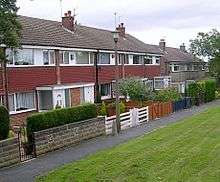Whinmoor
Coordinates: 53°49′55″N 1°26′46″W / 53.832°N 1.446°W
Whinmoor is residential area of Leeds, West Yorkshire, England. The area is 5 miles (8 km) to the north east of the city centre, adjacent to Swarcliffe and Seacroft in the LS14 Leeds postcode area. The appropriate Leeds Metropolitan Council Ward is called Cross Gates and Whinmoor. Historically the area was not part of the Leeds Country Borough but part of the Tadcaster Rural District, both of which at the time were in the West Riding of Yorkshire.
History
In November 655 AD (or perhaps in 654, according to one interpretation of the chronology), the Battle of the Winwaed took place around the Whinmoor/Cock Beck/Swarcliffe area, with the Christian King Oswiu of Bernicia's army defeating the pagan army of King Penda of Mercia, although historians admit that few details are available. A road to the south of Whinmoor was later named Penda's Way.[1]
In addition, during the First English Civil War, the Battle of Seacroft Moor, 30 March 1643, was fought over the two moors of Winn Moor and Bramham Moor, near Leeds. There is no exact records of Army positions, due to the amount of movement during the battle. As Sir Thomas Fairfax was instructed to capture Tadcaster, the Royalist Northern major-general, Sir William Cavendish, 1st Duke of Newcastle-upon-Tyne planned to intercept the smaller opposition. He sent his Lieutenant-General, Lord George Goring to do so; leading a large force of Horse. Fairfax had a problem, due to having a force made up of mainly clubmen (Locally recruited soldiers) and only three troops of Cavalry; this was going to be a 'wake-up-call' for the Parliamentary forces in the North. He was literally 'thrashed' by Goring, beaten back over the moor, with many casualties. Fairfax escaped with just some of his surviving Horse to Leeds, mainly because of bad communication in the ranks. Fairfax quoted that it was "the greatest loss we ever received".
Crime
Crime in Whinmoor has slowly decreased, although there are still reported crimes of drug dealing and car theft.
Leeds City Council purchased Whinmoor from the Tadcaster Rural District Council to build homes as an extension of the Seacroft housing development. In the early 1960s the council had planned to build 5,000 dwellings, a small shopping centre and other amenities with a pedestrian link to Seacroft. Work has begun on new homes off A64 near Red Lion public house. Planning for more homes near Wetherby Road and improvements to the Ring Road will see more change in the coming years.
Other information

Whinmoor is often classed as a part of Seacroft, a name which is used as a catch-all term for extensive council estates of eastern Leeds (also including Swarcliffe). It formerly had a large proportion of council housing, of which most are now privately owned.
However now signs indicate the boundaries of Whinmoor - S. Elmes requested this on behalf of residents of Whinmoor to highlight the boundary.
Until 2010 it was part of the Elmet constituency, with MP Colin Burgon, who had taken over from long-serving Conservative MP, Spencer Batiste in 1997. It is now part of the Leeds East constituency, which includes Cross Gates, Whinmoor, Seacroft, Gipton, Harehills, Killingbeck, Temple Newsam, Halton Moor, Halton, Whitkirk, Colton and Austhorpe. The present (Labour) MP is Richard Burgon, George Mudie.[2]
Whinmoor is in the Leeds East parliamentary constituency, represented by George Mudie. Whinmoor was also the eastern terminus for First Leeds "Overground" bus services 4 (ftr route ) The 16, 16a and 56 now run to Whinmoor terminus.
 Hathaway Walk, Coal Road
Hathaway Walk, Coal Road The Penda's Arms, Naburn Approach
The Penda's Arms, Naburn Approach Naburn Court and Day Centre, Naburn Approach
Naburn Court and Day Centre, Naburn Approach
Notes
- ↑ Campbell 1995, p. 8.
- ↑ Rayment, Leigh. "The House of Commons Constituencies beginning with "L"". Leigh Rayment. Retrieved 29 July 2011.
References
- Campbell, James (1995). Essays in Anglo-Saxon History. Hambledon Continuum. ISBN 978-0-907628-33-0.
External links
- Population by NOMIS
- The Ancient Parish of Barwick in Elmet at GENUKI: Whinmoor was in this parish
- "St. Pauls C of E Church".
- Demolition of Flat Whinmoor, East Leeds 2001 video - YouTube

